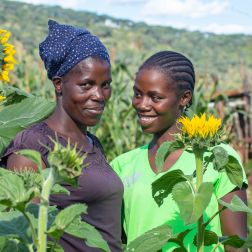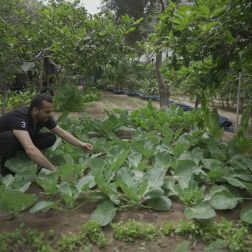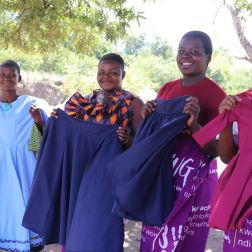- 2 mins read time
- Published: 15th January 2013
How you’re supporting people living with HIV and AIDS in Malawi.
What value can you put on a human life: A million? A billion? Perhaps priceless?
How about €0.28/£0.23? That’s what it costs to provide a Malawian living with HIV with life-saving anti-retroviral (ARV) drugs.
But for two-thirds of Malawians with HIV that price is too high.
This is a country poor even by African standards, and one which is ravaged by HIV. One million people – 1 in 12 – of the population are living with the virus.
On a recent visit to Malawi, Oxfam ambassador and actor Bill Nighy met with some of the people who have had their lives transformed by ARVs.

CAPTIONS: TOP-LEFT: Enoch, a Malawian farmer in his 60s, says anti-retroviral (ARV) drugs have kept him alive. Gus Gregory/Oxfam. RIGHT: AIDS orphan Fanny Jeofry (16) in the Kayera District, Malawi. Your donations are helping to provide holistic care for orphans and vulnerable children affected by HIV and AIDS. Abbie Trayler-Smith/Oxfam. BOTTOM-LEFT: Actor and Oxfam ambassador Bill Nighy meets Mara Banda and some of her helpers. Mara runs a support programme for people with HIV near Malawi's capital Lilongwe. Gus Gregory/Oxfam.
Take Enoch, a farmer in his 60s, who has been living with HIV for 10 years: “If you’d seen me three years ago you wouldn’t think I was the same person. “I was very, sick, I couldn’t stand up. I’m alive today because of the medication I receive.”
Donations from our amazing supporters across the island of Ireland are enabling people living with HIV and AIDS in Malawi to know their rights to access HIV prevention, treatment and care services, and advocate for these rights locally and nationally.
We believe that the best people to assert these rights are community members themselves. That’s why we help local organisations get the resources and develop the skills needed to ensure the voices of those living with HIV and AIDS are heard. This means they’re helping to influence health policy and calling for increase in the allocation for people living with HIV and AIDS in national health budgets.
Your support is also helping to tackle the stigma that can surround people living with HIV and AIDS in their own communities, along with addressing harmful social practices that put women at risk of infection.
It’s also helping to provide a holistic package of care for orphans and vulnerable children affected by HIV and AIDS, including psycho-social support and ensuring access to education.




